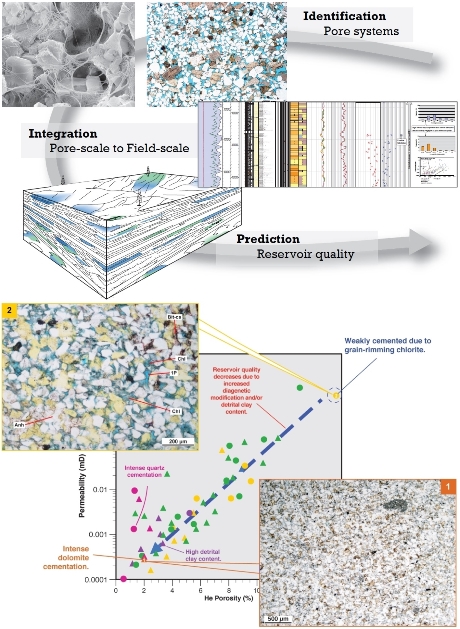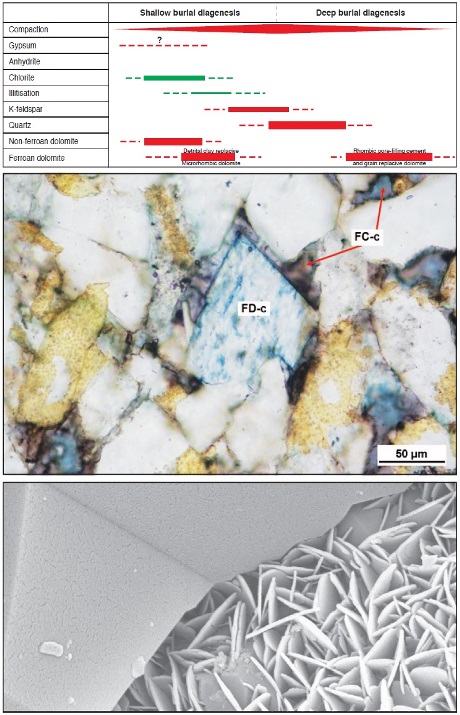
Course summary and outline
This one-day awareness course is designed to help attendees to understand every geological aspect of the decision trees involved in clastic reservoir pore system analysis. The course covers the controls on pore system evolution from deposition to present day, contrasting the roles of depositional attributes and diagenetic processes, with a special emphasis on predictability. Pore system degradation pathways will be discussed and visualised with the help of representative diagrams and photomicrographs. The final session will provide further opportunity for re-enforcing the understanding with a series of case studies.
Session 1: Reservoir quality analysis - what it is and how to approach it?
• What is reservoir quality analysis?
• Introduction to clastic rock pore systems
• What controls the reservoir quality of clastic systems?
• Commonly used analytical tools and new developments
• Work flow and decision trees
• What is reservoir quality analysis?
• Introduction to clastic rock pore systems
• What controls the reservoir quality of clastic systems?
• Commonly used analytical tools and new developments
• Work flow and decision trees
Sessions 2-3: Controls on Reservoir Quality - from deposition to present day
• Depositional controls on reservoir quality
- depositional environment and reservoir quality
- texture and fabric; their influence on porosity and permeability
- matrix, pseudomatrix and organic matter
- effects of detrital composition on early diagenesis and compaction
• Burial and compaction
- mechanical and chemical compaction
- what to learn from compaction analysis?
• Early diagenetic processes
- environmental control on early burial geochemistry
- early cement phases
• Burial diagenesis: cementation and dissolution
- authigenic mineralogy; common cement phases and grain replacements
- secondary porosity formation by dissolution
- hydrocarbon charge and its effects on diagenesis
• Pore system evolution and the predictability of porosity degradation
• Depositional controls on reservoir quality
- depositional environment and reservoir quality
- texture and fabric; their influence on porosity and permeability
- matrix, pseudomatrix and organic matter
- effects of detrital composition on early diagenesis and compaction
• Burial and compaction
- mechanical and chemical compaction
- what to learn from compaction analysis?
• Early diagenetic processes
- environmental control on early burial geochemistry
- early cement phases
• Burial diagenesis: cementation and dissolution
- authigenic mineralogy; common cement phases and grain replacements
- secondary porosity formation by dissolution
- hydrocarbon charge and its effects on diagenesis
• Pore system evolution and the predictability of porosity degradation

Course Information
Instructor
Philip Hayward - Philip is one of Badley Ashton's US based reservoir geologists with an interest in clastic petrography and sedimentology. He has established experience in single and multiwell reservoir quality evaluation studies, dealing with Gulf of Mexico deepwater clastic reservoirs and clastic plays of East Africa. Project experience to date includes detailed petrographical, petrophysical and reservoir quality characterisation/evaluation of a variety of depositional systems with varying degrees of diagenetic overprint.
Participants
The course is targeted at geoscientists, petrophysicists and engineers with a mutual interest in pore-scale reservoir quality prediction in siliciclastic plays.
The course is targeted at geoscientists, petrophysicists and engineers with a mutual interest in pore-scale reservoir quality prediction in siliciclastic plays.
If you would like more information on this, or any other courses, please e-mail training@badley-ashton.co.uk or call +44 (0) 1507 588353.

Case Studies
The following case studies may be of interest:
Publications
The following publications may be of interest:
- Pore-scale fabric as a tool to distinguish in situ from remobilised mudrocks in deepwater deposits
- Sedimentology and Sequence Stratigraphy controls on Reservoir qualities distribution in high heterogeneous carbonate rocks; case study; in a Giant Offshore Oil Field, Abu Dhabi
- An Integrated Approach Towards a Holistic Sedimentological and Pore-Scale Characterisation of Fine-Grained (Shale) Unconventional Reservoirs
- An investigation of porosity–velocity relationships in faulted carbonates using outcrop analogues
- A sedimentological and diagenetic description of the Carboniferous section in RKF Field, Berkine Basin, Algeria



